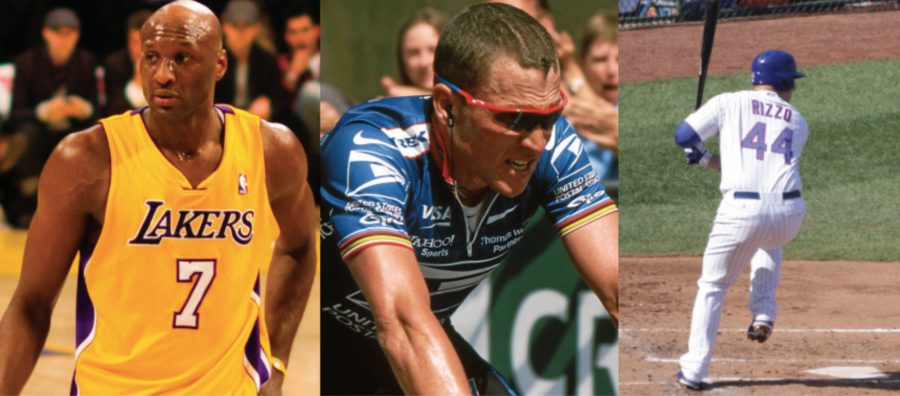Should athletes be role models?
Courtesy of Bridget Samuels via Flickr (le ) and Wikimedia Commons (center and right)
(Left to right) Lamar Odom, Lance Armstrong and Anthony Rizzo’s personal choices mold reputa- tions that in uence their respective fans.
February 21, 2017
Young adults and children idolize athletes. They’re considered role models because of their media presence and ability to help or change the lives of those less fortunate. For awhile now, there’s been a debate on whether they should be looked at as such.
Each of us has our own talent whether it is playing basketball, baseball or another sport, and we present our craft differently to one another. These athletes are not perfect, so they shouldn’t be put on a pedestal because we all have flaws. It makes it worse because their actions are highlighted in the media and people see that and want to imitate it, good or bad.
According to an ABC News article,“three-fourths of the 1,500 10 to 17- year-olds and 1,950 parents surveyed said athletes teach children that being a good sport and playing fair are as important as winning.” But the article also stated that children think it’s alright to receive special treatment on and off the court, and being promiscuous is alright.
This is teaching children not be held accountable for their actions when in reality they are held accountable. People have forgotten what it means to be a true athlete, being a team player, the reward of hard work, the importance of dedication and enjoying what you love to do, not just for fame and fortune.
Lamar Odom, a retired player for the Los Angeles Lakers and championship winner, struggled with a drug addiction. He was found unconscious and was on life support, but he came out of the coma days later. Odom might not be doing drugs now but that will be attached to his name forever.
Then there is Lance Armstrong, a cyclist and cancer survivor. He was a seven-time winner of the Tour of De France before being stripped of those titles because he used performance enhancement drugs.
In the Sportster it said “he not only ruined his name but other team member’s careers as well. I’m sure both these players had a following of children and adults that idolized them and wanted to be just like them.”
I’m not saying all athletes are not good role models but should be aware of the examples they are setting.
Chicago Cubs first baseman Anthony Rizzo recently reached out by tweet to a boy who was beaten in the hallway of his south Elgin middle school for allegedly bumping into a student. The tweet read, “Heard you are a big cubs fan Henry. When you are better I have a couple tickets and BP (batting practice) passes waiting for you at Wrigley. #Stay Strong.”
On a local scale, the definition of a role model has college students expressing their two cents.
Senior Devin Pickell played sports growing up, so he understands the need for sports athletes to be role models. He states “a good role model is someone that children and adults can both look up to, and see themselves in, and emulate something great in life. Athletes should be role models because they are one in a million and do things you and I can’t.
Pickell’s sentiments were joined by fellow student Catherine Perez, who see’s athletes as role models for the athletic crowd. She stated that a role model “is humble, [has] good leadership skills, and caring for people.”
You may ask, “Well if athletes shouldn’t be role models then who should be? That’s for you to decide. Why don’t you write an opinion and give us your thoughts on this topic.
Read more from the Independent:









Jackie • Feb 12, 2021 at 7:53 am
Well here are my thoughts, I don’t think athletes need to be role models. They are human like any of us and yes I know that they are well know, but people shouldn’t be defined by their mistakes. My father father is one of my role models and he has a rough past, but that doesn’t get in the way that he is an amazing person and has a beautiful heart. Maybe we should look at people for who they really are and not their mistakes.
Tristin Farrell • Feb 18, 2020 at 8:58 am
If you could provide the sources used in this article, such as the ABC news article and the different players mentioned in the article, it would be greatly appreciated as I’m doing a paper on this as well.